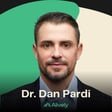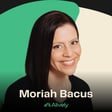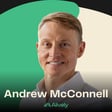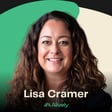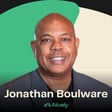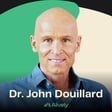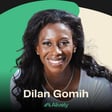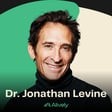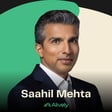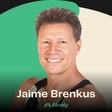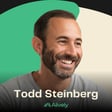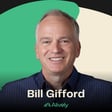Foundation of Health: Steps, Protein, and Resistance
00:00:00
Speaker
Having had a son that nearly died, I understand that quote that he has his health has a thousand dreams and he who doesn't have one. It really is. So what's that first step that you can take in your health? And if you aren't getting the 8,000 steps in a day, well, there's the first one. Got that? Then do the protein. Got that? Then do the resistance training. And you just build on that foundation of all of these majors, the 80% that are going to really be those big rocks
00:00:29
Speaker
This is the Home of Health SPAN Podcast, where we profile health and wellness role models, sharing their stories and the tools, practices, and routines they use to live a lively life.
Meet JJ Virgin: Expert in Nutrition and Fitness
00:00:43
Speaker
JJ Virgin is great to be back with you this time, not sweaty, doing 10 minutes of exercise snacks, which I'm sure we will get to. But before we dive in for the audience on everything you are, everything you do, everything you have done, how would you describe yourself? I'm a lively mom and wife and dog mom, too, and a nutrition expert, fitness hall of famer and New York Times bestselling author.
00:01:12
Speaker
Just a few things in there, just a few things. So there will be a lot to unpack, and I know the audience is going to be very excited to hear from you.
Exercise Snacks: Short Bursts, Big Benefits
00:01:20
Speaker
So I do want to go back to the amazing Eudaimonia Summit, where we were together. And you did numerous different sessions, but the the one that I was able to enjoy and participate in was this idea of exercise snacks.
00:01:36
Speaker
Can you please for our audience describe what they are and the benefit? I mean, you had some pretty good data and research on the impact of them that I think will surprise a lot of people. I know it's wild, isn't it? Well, it all it actually started for me years ago.
00:01:56
Speaker
When I was, I mean, this was like 25 years ago or maybe 30 in grad school, a study showed up and the study said, was comparing three times a day, 10 minutes of exercise bouts versus 30 minutes a day. And what they discovered was the people who did three times 10 had better results than the 30 minute people.
00:02:17
Speaker
I remember at the time the thinking was, well, because that was back in the days that you will not remember, but way back when the the predominant belief was that if you couldn't work out for at least 30 minutes, ideally 60,
00:02:32
Speaker
And this was everything was focused on cardio, aerobic training. You shouldn't bother because you had to get into your fat burning zone. And if you didn't get in your fat burning zone, it wasn't worth it. Like how ridiculous. So there was this little study that said three times 10 versus 30 and the three times 10 beat the 30 and everyone was like, what is going on?
00:02:53
Speaker
And I remember at the time people were like, well, that means like they either could do 30 or not versus at least they got one 10 minute in piece. And I thought, well, what if it was just that if you knew you were only going to do a short amount of time, you actually will make sure you do it. You're more compliant and you do it harder. So that was kind of the head scratcher for me all these years. I was trying to find the data on this.
Teaching Fitness: Actionable Routines and Real-Life Skills
00:03:17
Speaker
And then this whole idea of exercise snacks came to the surface and a couple months before eudaimonia when they asked me to teach an exercise class. And I thought, well, geez, I have not taught an exercise class for a good 25 years, but this'll be fun. I'll do it. I thought, what do I want to teach? And they go, we have no equipment. I'm like, all right, no equipment. And
00:03:44
Speaker
you know, and everyone becoming in at different levels. And my biggest goal was I wanted people to walk out with something actionable they could use again and again. Like you going in to do an exercise class for 15 minutes or an hour and then never doing it again. Who cares? But if, if I could with an hour class, give you something that you could do now every day,
00:04:08
Speaker
that could change your life, hey, we're on to something. And that's what this was set up to do. There's this concept called VILPA, vigorous intermittent lifestyle physical activity. Now I'm a little obsessed with high intensity interval training and high intensity functional training. And that is where you go all out for anywhere from 10 seconds to four minutes, and then you recover and you repeat. And what we know about that type of exercise when you do short bursts that are really hard is that you drive up the lactate, which then can become a fuel source for your heart and brain. So it's really good for you. It drives down visceral fat. It teaches your sympathetic nervous system how to handle stress better. And you actually fit stuff in and get a little metabolic boost where you create some oxygen debt that your body now has to pay back.
00:04:57
Speaker
There was a study that came out that showed that this VILPA, this vigorous intermittent lifestyle physical activity, 10 minutes total a day done in one to two minute bursts, that if you did this every day, as opposed to people who didn't, you reduced your all-cause mortality by anywhere from 40 to 50%. And if you were a slacker and you just did four and a half minutes a day, you reduced your all-cause mortality by 28%.
00:05:23
Speaker
And I think to myself when i when I read this, I'm thinking, well, what's the biggest reason people don't exercise? Now, since I've done this for 40 years, I can tell you the two biggest reasons. Number one, what do you think it is? Time and it's uncomfortable. It's time and I don't want to go to the gym. Okay. It's the kind of thing where I'm too out of shape to go to the gym and you're like, well, wait a minute.
00:05:47
Speaker
you know So don't want to go to the gym, don't have time. This takes care of both of those things. So that's what I was putting together at Unimony was using this research that showed that these one to two minute bursts, now I pushed it a little bit, I took them to three and a half minutes.
00:06:03
Speaker
these bursts done throughout the day can have this dramatic impact on your health, on reducing your risk of death, right? And I would also argue done in the way that we did them, which is high-intensity functional training, where we were doing things, I like to say, you train to get better at life, you don't train to get better at training. So we're doing things that mimic what you'd have to do in life.
00:06:27
Speaker
Right. So when you do those types of things, you're going to get stronger. You're going to handle stress better. You're going to burn off that visceral adipose tissue. So that's what we did at eudaimonia was this concept of exercise snacks. And again, whatever your fitness level, the cool thing with high intensity interval training is it's relative to you. So for someone, high intensity interval training may be 20 air squats. Right. It might be walking up the stairs. It doesn't matter. And it never gets easier. You just make it harder. Like I had someone tell me, Oh, I've been doing your HIIT training and I was doing, you know, one minute burst, but I got so much stronger. I'm doing four minute bursts. I go, no, you just make it harder. Yeah. You need to burst more during that. This plot, you know,
00:07:18
Speaker
Yeah, I love two things about that. i mean one so one Anyone curious for ideas for these stacks? J.D. wrote them up and I posted them on Instagram so you can see the individual circuits as well as a long list of all the different exercises that she shared with us and suggested, including some stretching at the end because flexibility is certainly Well, but there was a reason I did that that way. And that was really interesting. And I credit Gabby Reese for this when she told me this. I'm like, that's the smartest thing I've ever heard. It actually wasn't stretching. It's kind of interesting. The research on stretching is not that great. I still look at people and they're like stretching before they work out. There's no evidence that stretching before you work out does anything. In fact, it might be detrimental.
00:08:05
Speaker
What I've always found is that if you move through full range of emotion, it's going to be better for a hypertrophy anyway, but it's also going to be it's mimicking more of your daily life. What I put at the end was balance. Right. That's right. And the reason I put balance in when you look at, you know, how do we have the best the best aging? How do we make sure that what we're doing now is going to let us do the cool stuff we want to be able to do in our 70s and 80s?
00:08:34
Speaker
and balance is a big thing that we lose. And so what Gabby Reese told me, she goes, I train balance after I'm exhausted because that's when people get hurt.
00:08:46
Speaker
Most people don't trip and fall when they're like, you know, at their peak. They trip and fall when they're tired. They've got too much in their hands or whatever. So at the end of doing those bursts, which of course we did four different high intensity functional training bursts. They were between like two and three minutes each. And we did two rounds of each of them. So this was, this was basically a hit class, right? But I created taught snacks so you could take them home with you.
00:09:15
Speaker
But then after that, we did our balance training. And it was fun because I mean, I was falling over. I was like, you're going to fall over. It's OK. Yeah. Yeah. The other thing, and I think this is going to be a common theme in our conversation, just from what I know about you, is that Pareto principle. right of it's not You have to do everything. it's Actually, you get 80% of the benefit from that first 20%. My own personal experience, you know as I was a D1 All-American athlete on the national team,
00:09:47
Speaker
And what I took to train and be a D1 athlete, where we were going 11 practices, 12 practices a week, plus trial and weights, everything, like hours and hours, I took two years off and then went to the UK and competed and we would do three to four practices a week for like 45 minutes.
00:10:03
Speaker
And my 200 meter time was within two seconds of what it took me to be an All-American. And you realize 90% of the effort when you're competing at that level is for that last incremental bit, because that matters. But for life,
00:10:19
Speaker
getting that 80% benefit, whether it's how we approach nutrition or sleep or it over optimizing is probably not how we want to live day to day. If you were a professional athlete, yes, like you want to squeeze out every single drop and put it in. But for most people listening to that to this, we're not. It's how do I live the life that I'm aspiring to, right? Yeah, which is great because here's the reality. That 20% is why most people don't want to do it.
00:10:47
Speaker
It removes all the fun and joy and everything else out of it. And what I find with a lot of people is they missed in the 80% is the majors. It's the things that will really move the needle that make the big difference. But what I find with a lot of people is they skip past that and they're looking for some fun thing. You know, maybe it's the red light or the supplement. or the way I was like, those, hey, those are cool.
00:11:11
Speaker
But those are when you're going to buy the car, what's the upholstery? Right. You know, those are not the engine or the battery. Right. Selecting the quality of speakers to pop into it versus like what's actually moving you from A to B. Yes. Yeah. You mentioned. So this we we talked a lot about the exercise snacks and that was one they're super beneficial. Anybody can access. You can do it in the office. You can do it it like ah just hands up.
00:11:38
Speaker
On airplanes now every sixty minutes i go to the bathroom and i do twenty squats in the bathroom because i used to do i'm in the the middle of the island people kind of freak out but now that i wouldn't freak out though now they think you're super cool i know i drink a lot of of sparkling water on the plane so i'm always up and down like i have to sit in the aisle cuz i'm like back and forth.
00:11:57
Speaker
Yeah, but that's kind of working around set circumstances. Now, I know how big you are on muscle and strength, and you said, hey, this was a situation because we didn't have access to equipment. For someone who is looking maybe to build their home equipment, like what's your go-to at-home equipment that people can access? And and what does your own kind of week-to-week fitness regimen look like?
00:12:22
Speaker
So i'm I have a really cool gym at home, I will admit. um However, you know it's interesting, i I take it in a matter of degrees. At the very minimum, get a TRX. I think this is one of the most underrated things, the segmental trainers that use your body weight but also leverage so that you can make it harder.
00:12:46
Speaker
So a TRX you can get for around a hundred bucks. And all of a sudden you can do pulling exercises, pushing exercises, squats, jumping, et cetera. So that's kind of my like, let's at least get that. If we can step up from that, dumbbells and a bench or a big exercise ball that you can use as a bench are my next step for that. Because ultimately what we want to be able to do I am, ah even though the research now has come out showing that you can build muscle the same if you're using machines versus using free weights. While that is true, or appears to be true, what's also true is that we are not bolted to the floor.
00:13:32
Speaker
and you know right And when you think about it, I'm not training to be able to do a leg press better. I'm training to be able to get off the toilet, get out of a small car, pick up heavy stuff. And that's very different. And so if someone's got a lot of injuries, they're unsure.
00:13:49
Speaker
Machines can be a great place to start, but ideally I really like to use cables and free weight and body weight because it's going to make your nervous system has to pull in a lot more. You have to use a lot more stabilizer muscles. And those are the things that matter when we're having to move quickly, get out of the way of something, pick something up fast.
00:14:08
Speaker
that tends to we tend to lose as we age, right? We lose muscle starting around age 30. It's three to eight percent per decade, so up to one percent a year. But it's two to three times more that we lose strength and four to six times more that we lose power. So I always look at how can I make sure that I'm incorporating as much of that in and along with balance and flexibility and agility so that we have that all.
00:14:31
Speaker
so The good news about that is like that means we can do a lot of this stuff at home if we have heavy enough dumbbells right to be able to do it. And you start with so you start easy, maybe 5, 10, 15 if you're a woman, and then get more as you progress because things should never get easier. You just keep getting stronger. That makes a lot of sense. And then in terms of kind of week to week your schedule. Do you get most of your zone four through high intensity interval resistance training? And then do you focus on zone two at all? I don't do zone two really.
00:15:10
Speaker
every once in a while. um Here's what I do. And this is my progression for every human. All right. So this is my, this is the way I think about this is the first thing that I want to make sure that we're doing is actually moving more.
00:15:27
Speaker
To me, moving more is like brushing your teeth, right? Really getting in, and and you know when you look at all of that research of the sweet spot of how many steps per day, it really seems to be around 7,500, 8,000. Now, that is the floor. That's the minimum, right? But if someone's coming to me and they're starting, and I literally had this happen, I had someone who was ah doing the average American is getting in 3,000 steps a day, and someone who came to me was getting 2,500 steps a day in.
00:15:56
Speaker
So before i start doing any of the other stuff i'm like let's get you actually getting in hitting that eight thousand steps a day. So that's my first part once they're doing that what i love to do next is add in a little intensity in the easiest best way to do that to me is to add in a rocking best. I think rocking best thing ever because especially for women this is loading your hips.
00:16:22
Speaker
Right so it's great for bone mineral density and it's an easy way and easy way to add some intensity i move to florida so we don't have health so unless i want to go walk up and down a bridge i got no hills but a wrecking best works out perfectly for that.
00:16:38
Speaker
and I can increase the intensity. So it's simple. So that's an easy one. And when you think about it, if you are 40 plus, you've rucked in your life because you used to have to carry books to school. So, you know you had a backpack, you had books, that was rucking. So we've all rucked. So we're just gonna do some rucking. Once you do that, the next thing that I add in is resistance training.
00:17:03
Speaker
And when i think of resistance training i divide the body into four and i focus on three so upper body pushing things like a push up and overhead press and particularly love overhead presses because they load the spine and they mimic. Me in the airplane cuz i put so much in my carry on right.
00:17:23
Speaker
So, you know, it's like I always look at my, weigh my other suitcases and go, uh-oh, overweight. So everything gets into the carry-on. So my carry-on can be like 70 pounds and I'm going to be hoisting that into the overhead. So, you know, this is really mimicking normal life. A dips, another one pushing yourself out of a chair, upper body pulling are things like a pull up, a pull pull down an overhead press
Functional Exercises: Strength and Life Skills
00:17:49
Speaker
at bent over row. I love bent over rows because you're picking something off the floor, just like a deadlift. And then hips and thighs, things like squats, step ups, deadlifts, bonus points for adding in some jumping into that, right? Jumping up onto a box or jumping after an air squat. And then there's power core.
00:18:07
Speaker
crunches and things like that. But truthfully, if you're doing deadlifts and squats and you're doing pushups, you're doing it. So that's what I always look at is is i never in my life, I can't think of a reason I would ever need to be really good at crunches.
00:18:24
Speaker
Like, what's that doing for me? You know? Yeah. I mean, it's a good point. and that Going back to the the benefit of the free weights versus the machine of having to work those stability muscles, you're getting a two for with a lot of those other exercises. And that's what I'm always looking for. Like, how do I get as much in as possible? So I do that. And for hypertrophy, if someone the the cool news is if you're new to resistance training, it doesn't take much to start to get stronger.
00:18:50
Speaker
And if you've been doing resistance training for a long time, it doesn't take much to maintain your results. It does take to push past where you are. So, you know, basically kind of my bare minimum is to do two days a week of each of those different body parts and get in 20 to 30 sets of each body part. So maybe I'm doing pushing and overhead push-ups and overhead presses twice a week and I'm going to make sure that I get in at least 10 sets twice a week. So that's the first thing. I tend to do things more like three times a week because I'm still trying to put on muscle. Like my goal is to pack on as much muscle as I possibly can. This is my 401k. It's like my physical 401k.
00:19:33
Speaker
Right. And, you know, once you get to a certain point, you have to keep progressing in order to put on muscle with volume. So I'm either going to do more weight, more reps, more sets. Right. Another exercise. But you've got to do something.
00:19:49
Speaker
So once you've got that going, the next thing I add in is high intensity interval training. And so I do that on, you know, two to three times a week. I'll put that in and I vary that up depending on what I'm feeling like that day. Sometimes I'll do the horrific Norwegian four by four, which is four minutes of relatively like what you could do hard as possible for four minutes. Then you back it down and go easy for three and do it again. And you do four circuits of that. And that's really to drive lactate up because your body can use that as a fuel source for your energy for your brain and your heart. So it's really good for ah mitochondrial biogenesis for getting get new mitochondria going. and And then one day a week when I'm home, I should really do this when I travel too, but I use it as a scapegoat excuse, I admit it. One day a week when I'm home, I go to yoga. I hate yoga.
00:20:43
Speaker
And I always say in my next life, I'm gonna be a yogi, but it is, I think for people 40 plus yoga is, resistance training is the most important then hit training, but yoga is right there with it because it makes you do crazy balance stuff that you would never typically do. And I'm so competitive and I go to a class with 25 year olds. So.
00:21:07
Speaker
Yeah. But the I mean, the funny thing like being an athlete and you go into the class, there's a 62 year old could just totally own you. Right. Because she knows her body so well. She's been doing it. So like you think you're so strong and you're like, I can't do half what your butt kicked in a yoga class. I like. Yeah. Yeah. it It really it's a different skill set. they They came in my senior year. The squash teachers had a background in yoga and taught us and everybody loved everybody started doing yoga thereafter.
00:21:34
Speaker
Like, oh my God, this just opens up so much that I didn't know was there. It became a real, real hit with the team. Yeah, I'm actually doing my, my I do a five by four because if four by four is good, I just figured like I need the fifth one just to do that. Oh boy, more is more. Doing it, doing it today. Overachiever. ah They'll mix like swimming some days on it or the rower or a salt bike. A salt bike is one of my favorites to do it.
00:21:59
Speaker
Yeah, I got a Sprint treadmill, and that's my like love-hate, my Sprint treadmill. Now, so you touched on muscle, right? And it's incredibly, like you said, your 401k insurance policy as we age, we're losing a percent, we really need to invest in it, put put you know investment in the bank,
Resilience and Nutrition: The Macronutrient Focus
00:22:20
Speaker
that muscle bank. And it's not just the work we do, we have to fuel it. So I know a big thing for you is protein intake,
00:22:28
Speaker
And so i'd I'd be curious your whole nutritional approach personally, like we can start with protein, but I'd love to kind of hear the overall how you think about nutrition on that 80 20 probably again. Yeah. You know, when you think about everything we're doing, everything we're doing is to build resilience. Because, you know, we live in a really bizarro world that is not built for our biology, really. We're kind of living against a lot of the ways our body should live. And so we've we we're building for resiliency. So when I think about nutrition, I always start again, macro to micro. So the very first thing is I had a great nutrition mentor early on and he was like, add before you take away. Because quite often, like I worked in weight loss for years and people would literally come to me for their first visit.
00:23:22
Speaker
And I always had them do a couple days of a diet recall before they came in. And it would be a horrific thing to see because it was basically like they felt like when they saw me, I was gonna take all these things away. So they wanted to eat all the things, clear out their pantry, et cetera, right? And they'd come in and I'm like, oh, I'm not gonna take anything away actually at the start. I'm gonna like have you start to focus on some things and crowd out the bat. And so the very first thing that I like to do is have people First, do a macro audit. So just for a week or two, just to actually track what you're eating and not just track it with an app, but track it with an app and a food scale. Because we know we underestimate what we eat by like 20 to 40%, even the dietitians do.
00:24:09
Speaker
And so you've got to weigh it in. So that's the first place I start with people is just getting them curious. And what's so interesting with that is even without any instruction, just having someone do that, they'll start to make shifts because they'll go, Oh my gosh, I got no idea. Right. So that's step one, then I'm going to start to optimize protein. So next step in the reason that I have people do this, I mean, yes, muscles going to unique protein to fuel muscle protein synthesis to build muscle. But that's not actually the reason I'm doing it first. The reason that I'm having people eat protein first is because
00:24:48
Speaker
When they do, protein is the most satiating of the three macronutrients. Where we have protein is really, I call it our function macro. It's going to help us rebuild, renew, regenerate. Fat and carbs are energy macros that we are going to use for fuel sources.
00:25:06
Speaker
And so the first thing I have you do is eat protein. When you're eating protein, it requires about 20% to 30% of its calories in the digestion and assimilation process, contrast that with basically nothing for fat and about 5% to 10% of the calories for carbs. So first thing is eating protein first. If all you did was take some of the calories away from fat and carbs and put them over in protein, that in itself is going to result in some fat loss.
00:25:30
Speaker
then we know protein is more satiating and satisfying. And I say both those words because we know it's satiating, it slows down stomach emptying, it triggers GLP1s, right? But it's also satisfying because those amino acids are how we're making those brain chemicals like dopamine and serotonin that tell us, hey, you're cool. So satiating and satisfying,
00:25:53
Speaker
People who eat protein first tend to make better food choices overall. It's good for blood sugar control. I know there's all this out there that we should be having veggies first for that, but there's a reason that I'm having people do this first because it is more satiating and you'll still get that blood sugar control. So that's where I start is let's just eat the protein first. Now, if you're eating animal based products,
00:26:14
Speaker
you're gonna get some fats with that too. And that's why it's important that you are what you ate, that you're eating clean because it's generally the fat in the animal where you're gonna get the problems because that's where the toxins go. So this is why we wanna eat as clean as possible. So we're not getting a bunch of pesticides, herbicides, hormones, antibiotics that would be stored in the fat.
00:26:39
Speaker
but all of the stuff gets counted in that app the next thing that i have people do after that is focused on non searching vegetables i'm divided the plate for me is protein fat non searching vegetables and then it starts your carbs and fruit.
00:26:55
Speaker
I've never really understood why we put fruits and vegetables together. If you put fruit and vegetables together, people will eat potatoes and apple juice, right? Yeah, that that would be sad. Yeah, but it's that it's the reality. So you cannot say, you know, broccoli is the same as a potato is the same as apple juice. It's just ridiculous. So I put non-stirty vegetables so next.
00:27:21
Speaker
with the goal of getting five or more servings a day like really ten or more with a lot of diversity in that where you want to have like it like as many different types of vegetables and colors so you get the different polyphenols which then help your gut microbiome have more diversity which is everything for your health.
00:27:43
Speaker
So that's the next phase. And I figure with most of us when we make vegetables, we're probably using a little fat there too. So between those things, I find most of us generally between our protein and our non-starchy vegetables probably have gotten enough fat, especially women. Because while I focus more on macronutrients and what we're getting,
00:28:06
Speaker
you know You can't completely count out calories. You eat too much healthy food. You're going to you know have too many calories. They got to go somewhere and they're going to be stored, right? so After that, I get into a little bit of fruit, generally like a couple cups of berries. And then depending on what you've got going on, starchy carbs, things like potatoes, winter squashes, root vegetables, legumes, et cetera. So I mean, that's the basic thing. How many carbs and how much fat, which is the end old question and the big debate out there and will always be.
00:28:41
Speaker
there There is actually no, I haven't seen any research to show that for a weight loss diet, one is superior to the other. I think it really depends on the person and how they feel best. Someone who's got more insulin resistance coming in,
00:28:57
Speaker
probably is gonna do better on a higher fat, lower carb diet. Someone who's got more adrenal exhaustion is more of an athlete. It's gonna do probably better on a higher carb, lower fat diet, but it's so, it's like, what do you like? What feels good? what's What works for you?
00:29:12
Speaker
right It's similar, I think, with nutrition and fitness and all these others. of There's not an objective right answer. and if You don't say, oh, I hate running, so I hate exercise. like No, you just hate running. There are infinite varieties. Oh, I don't like asparagus, so I hate vegetables. No, you don't like asparagus. like Go find the stuff you do. like just There's an infinite number of plants. Go play with them.
00:29:33
Speaker
yeah Yep, there's all sorts of ways to get there, right? Yeah, and I know we talked about like majoring in the majors, not the minors, but with thinking about the plate and everything that goes into it, do you find you still need or want to supplement anything? ah Magnesium because of soil quality or vitamin D or adding a protein powder because you're not sure you're getting enough
Longevity Supplements: Creatine and Amino Acids
00:29:55
Speaker
in the... Oh, I love supplements. I love supplements. Love, love, love supplements.
00:29:59
Speaker
so My kind of foundational supplements are magnesium, like you talked about, um fish oil, but this also depends. I think it's it's important for someone to take an omega-3 index test. I'll tell you, it was interesting. i tend to I take generally one or two grams of fish oil a day. I eat fish three to four times a week.
00:30:22
Speaker
I take my mega three index you want to have your mega six to make it three about four to one this is what they think we necessarily used to do it keeps your inflammation in check. You don't want to be like people talk about omega six is being flamatory you want the balance like you don't want too much of one or the other you don't want to be too pro inflammatory you don't want to be too anti inflammatory to anti inflammatory you get you know stuck with a needle you'll bleed out.
00:30:49
Speaker
So I took my omega-3 index a couple months ago. I was like, oops. I was two to one because I just tend to eat a lot of grass-fed, grass-finished meat and seafood and you know supplement with fish oil. So I was like, I really actually probably don't need to supplement with fish oil. So this is where testing can be really important for for omega-3s. And it will also show you if you've been like eating a bunch of crappy oils, it'll show up there.
00:31:15
Speaker
And then um I also think it's important for your vitamin D. So I take a D3K2 product and I keep my vitamin D around 70, 80. So I like it 50 to 80 NGs per ml. But you want to make sure you're in the right range, right? This is really a pro hormone. Called a vitamin, it's really much more of a pro hormone. So you should test for that one too. And all the good lab companies now, these these easy things to do.
00:31:43
Speaker
So those are my foundationals plus the other foundational for me is creatine. And ah especially, especially like if I look back at my life, I wish I'd started taking this when I was a teen. I started lifting weights when I was a teenager. I started you know taking people to Goldsham in Venice in my 20s. And I think that's why I didn't let take any c creatine. I was lifting weights with the high school football team, because the girls didn't have a weight room. And I was going to Goldsham in Venice, which was the Mecca bodybuilding.
00:32:16
Speaker
and all the dudes to creatine. And so I thought it was like this anabolic, you know, thing. And I'm like, I'm not touching that. Right. And now come to find out that this is probably one of the most important supplements for longevity, for great health, because it's going to help you have more energy in your cells. Creatine as well as physical rate. Yeah. So 80 percent of creatines in your muscles, 20 percent in your brain.
00:32:46
Speaker
And so it's it's amazing for focus, for sleep deprivation, for jet lag, for mood, for depression. I've got a friend now using the type of creatine I use, creatine HCL, for ah a really cool dementia study. I mean, it's it's amazing. There's gonna be so much more coming out about it. So it doesn't build muscle per se.
00:33:07
Speaker
It allows you to work out harder and recover faster. It it gives your brain and body great energy, which then is gonna allow you to do more. And when you do more, then you can build more muscle, put more stress on your bones, which is fantastic. It's also great for your skin.
00:33:27
Speaker
So skin wrinkling, mood. and when i I've been doing a lot of travel around the world, and so I use it for jet lag. It's amazing. And I mean, in terms of bang for your buck cost efficiency, right? like So you talked about in high school, it certainly had that image. And my mom and is a physician. At that time in the 90s, they were saying, oh, it might mess with your kidneys or all these potential things.
00:33:53
Speaker
probably the longest researched supplement and there aren't really negative side effects. It's just a base of you should just be taking it. There's no like, it is so interesting because you'll hear hair, kidneys, I'm trying to think if there's any other ones. So here's the here's the reality with it. Creatine is the most studied supplement. You will hear you should take creatine monohydrate because it's been the most studied, which is sort of like you should not have an iPhone. You should only have a roti phone because it's been around the longest.
00:34:24
Speaker
It's the creatine that's making the difference, not the carrier. Turns out creatine monohydrate is and not a great carrier for creatine because about 85% of it is is extracellular. So it's causing gas bloating. um In fact, 76% of women using creatine monohydrate expressed that they got bloated from it. Contrast that with creatine HCL,
00:34:51
Speaker
which is 100% absorbed into the bloodstream. And so you can use a seventh of the the dose to get the same effects, so same price-wise, but you don't get any of the bloating that you hear because you want the intracellular fluid that you can get from creatine, but you don't want the extracellular, the bloating part of it. So that's the cool thing with the differences in creatine, but the it's still,
00:35:19
Speaker
Creatine, all the creatine benefits are creatine, not the carrier. You want to choose the carrier that you feel good on. Some people do phyno-monohydrate, so great. Use monohydrate. But for a lot of women, as I started recommending it, they were like, I don't like the way I feel. And I'm like, I'm like, you can get through it. No, they aren't going to get through it. Women don't do that. So that's where HCL can be great, because you won't experience those things that you might feel with monohydrate of the GI distress or the blue tea feeling.
00:35:49
Speaker
And you came out with a creating a sale rate that did what was really funny was i was speaking on a medical conference about creating about. Aging powerfully building muscle creating and the scientist behind hcl found me afterwards and started talking to me about it and i can i was like yes show me the studies.
00:36:13
Speaker
That sounds too good to be true, show me the studies. And because if you hear out in the world, the popular, you know, the litany is, monohydrates the most studied. And I'm like, no creatine is the best it's the thing doing the benefit, that's a carrier.
00:36:27
Speaker
And so as I started to go through all the research, I'm like, Oh, okay, I get it. So, you know, it's been fantastic. Cause again, I started two years ago saying every woman needs to be on creatine. And then I started getting all this pushback. And I went, Oh my God. And like, it and that's what made me aware. It was like tons of people. And I was selling monohydrate and I'm like,
00:36:51
Speaker
And it wasn't everybody. Some people do fine with it. It's like, great, use that. But it was enough. And what's also cool is to be able to use a much lower dose. So yeah, I put together, I'm actually doing an entire line of creatine products because I'm so obsessed with creatine, I admit it. but I put together a creatine taurine magnesium product because I wanted everything kind of an ATP booster. So ATP being the energy currency of the cell, I wanted something that would really support your body being able to produce energy. Yeah, that's beautiful. And so on the protein, knowing how important protein is, do you supplement with any protein or do you get it through whole foods? So I do two things. I've been using protein powders since I was 30.
00:37:35
Speaker
um So I love protein powders. I think they can be a really good supplement. So I tend to use those in the morning and I travel with them. And I also, along with protein powder, I also use collagen. Now collagen is protein. It's the most abundant protein in our body, but it's not a complete protein. Like you'll get with, you know, say if you were using whey or pee or one of these other ones. I'm actually, my pee protein is, is is just getting revised now to spike it with a couple of the essential aminos that's low in so it will be balanced like it'll be more similar to whey. But i I actually love using a protein powder. However, I think there's a next level to this and that's essential amino acids.
00:38:19
Speaker
And I'm now at a point and digging into this research that I think that this needs to be a mainstay for people, especially people who are on GLP-1 drugs where their appetite might be lower. These essential amino acids don't trigger satiety, but what they will do is give you those building blocks that you need and in you know not just for muscle protein synthesis, but for carrying hormones, for making neurotransmitters, for all the different, for building bone, all the different things that you need to do in your body. So I'm a big fan of essential amino acids. Every day I go to the gym with creatine. I'm working on a new creatine hydration product because I've been mixing my hydration product and my creatine and my essential amino acids all together. And that's what I go to the gym with. But I want to make sure I have enough essential amino acids on board
00:39:06
Speaker
Because we do about 300 grams of amino acid turnover a day, and you know some of it's regenerating you know old amino acids, but I want to make sure that I don't have to break down.
00:39:18
Speaker
that I'd rather have an ample supply for my body to use. And on that, I mean, you you talked about one of the benefits of creatine that I think people might not realize is that recovery side and its impact on recovery. And as we're pushing our bodies, that recovery, whether it's via sleep or other recovery modalities is incredibly important. How do you think about that, especially with someone that is having to travel and and works out and works as hard as you do?
00:39:47
Speaker
You know, it's so interesting back when I was a trainer, way back when I used to work out hours every day, hours and hours. And what I've discovered is that really the recovery is where I get all my gains. and and when i i would find before well like When I went on vacation, I got sick. I actually got stronger. i was like okay you know but it was so hard to It's such a mentality of more is more. It's like, that worked. I'll do this.
00:40:19
Speaker
so It's one that we really have to look at is you're not building muscle at the gym. You're breaking it down at the gym so that you can rebuild and get stronger. So I look at recovery first, the foundational one obviously asleep. And just like we don't need less protein as we age due to anabolic resistance, we don't need less sleep as we age either. So we really have to prioritize this. I'm a huge sleep is a big thing for me. It was tough at eudaimonia, those late night dinners.
00:40:49
Speaker
ah like What do you mean we're going to dinner at eight. Yeah, I mean it's funny at a conference like that where everybody talks about, you know, Brian Johnson's like, I eat my last meal a day at eleven because it impacts my sleep. But everybody said don't eat within three hours of bed. And then taking it to dinner at eight. you're like i How do you write your meals getting served at nine thirty and I'm like,
00:41:09
Speaker
Wait a minute. Yeah. It's like we didn't need to have dinner. We could have actually just gone out and hung out and been fine. So literally I eat i ate dinner two to three hours before bed. I try to make it three. Sleep is a huge thing for me. The other thing that I really love for recovery is sauna. Love.
00:41:29
Speaker
Hard to travel with the sauna. I've got two at home. I have a fast heating one. So in the mornings, what I like to do before I work out is I do a hot, ah my one that fast heats. I'll do 10 minutes of that, and then I'll jump into the cold plunge.
00:41:44
Speaker
but I won't do the cold plunge after I lift weights because you got to wait like six to eight hours. I haven't seen anything conclusive to say how long you really need to wait after you lift weights to cold plunge. So I i do it first thing in the morning instead, but you can do sauna after you work out and it helps with you becoming more, it's, it's anabolic. So yeah and it was growth hormone, all of that, right? I mean, sauna is one of the greatest,
00:42:12
Speaker
like You look at the happiest countries in the world that also have the best health and it's all the spa countries, right? It's Finland and Norway and Iceland. and I remember I was in Iceland and I was staying at this hotel called the retreat hotel. ah One of the top Top five hotel experiences of my life. It's built into the Blue Lagoon, but it's got its own private area. It's got the most amazing spa. You have water massages out in the Blue Lagoon. It's just spectacular. But that's where they had the real cold plunge, the real saunas and steam rooms built into the lava rock.
00:42:47
Speaker
But all of them spa every day. They're in the they're in the ah hot thermal spas, getting the silica, then they're doing you know saunas and they do it all together. And I'm convinced like this is where we're messing it up. We just don't do it. It's like a luxury here. On the sleep side, I mean, you talked about supplementing with magnesium. Do you have anything baked into your routine, any special thing with your bed or eye mask or earplugs, anything to kind of create your environment?
00:43:16
Speaker
useful So I take magnesium and i take I have a product called Sleep Candy, basically 5-HTP and melatonin and GABA, and then in anositol. And then i at home, I have a Samina bed. It is amazing. Sadly, it doesn't travel with me. That's Samina bed I'm like obsessed with, so that's great. I totally do the violation in that I have three small dogs and they all sleep with us.
00:43:46
Speaker
So, you know, but they actually all sleep through the night, 95% of the time.
Social Connectivity: Balancing Health and Interactions
00:43:53
Speaker
So it's pretty amazing. Yeah, I mean, you you bring up a good point, though. So like, if we think of someone like ah Brian Francis, I hate the number one thing is don't share your bed, right? Like it is very controversial, but if you want high quality sleep, etc. But to your point,
00:44:07
Speaker
This is about living the life and the connection. And what we were talking about the sign of benefits and they do it together. Maybe it's the doing it together is actually a really big play and having those dogs in your bed. So how is there to like the dog? I hear this whole thing about sleeping separate for better sleep. And and I'm like,
00:44:29
Speaker
No, I'm not missing that whole connection. wait are Well, are you are you like giving up $10 bills to pick up a quarter? Right. right like which Which is more valuable, because that connection, that proximity, that relationship, how that carries it, because we know the value of the connectivity with other human beings. And so how do you think about that? like It sounds like, hey, those aren't trade-offs I'm willing to make, right? Back to majoring in the miners. Just like I'm not willing to make the trade-off of, i'm you know I'm at this event.
00:45:00
Speaker
we get invited to these two amazing dinners, you know, and they're gonna start at eight o'clock at night. And I'm looking at this going, oh man, but I'm thinking, but this is amazing. Like I'm not gonna miss it. No, I'm not gonna do it. I don't care. You know, I'm gonna go do it. So, you know, that's, this is why we do these things so that we can go and stay out too late and eat dinner too late and maybe have a couple drinks.
00:45:26
Speaker
Gosh you know that's the other part i'm like okay i'm hearing my buddy mark this and say you know i found out that if you have a couple glasses wine a couple days a week you might live six months. Shorter overall yes i'll take it.
00:45:42
Speaker
And you know it's like I look at it and go, I love coffee. I think it's a health food personally. I like wine. Sometimes I stay out late. you know like you know We went and took a whole group of our mastermind members to a 70s dance club and all stayed out late and danced.
00:45:59
Speaker
I think that's good for the soul like you know those are the things that make make it all fabulous so this is why we do these things so that if we're getting a b plus a minus we're good you those people that are getting an a plus like.
00:46:15
Speaker
looks not fun to me. Well, and in the cost, the time and attention are finite resources. So what you're putting into one bucket, you are going to end up taking away from others. And so you mentioned the mastermind group. Are there other ways that you deliberately cultivate that social connectivity and social connection? Because there's very strong research. Socially isolated older adults have a 50% higher risk of developing early onset dementia.
00:46:43
Speaker
then they're more socially connected peers like Are there things that you're doing just like you think about the fitness delivery just like you think about the nutrition you're doing to cultivate that on the social side so i have created a whole community in the health and wellness space of.
00:46:58
Speaker
health practitioners and health entrepreneurs that has been getting together for 12 years. And it literally started because I was going to marketing conferences and I wanted to build my business and none of my friends from the healthcare conferences were there. So we just started getting together and it has become such a tight group of people.
00:47:15
Speaker
You know, now there's like the big event, we'll have five, 600 people, but our mastermind, like we just had, I had a small little retreat with 30 of our 80 mastermind members this last week. And we just had the best time. We had a margarita making contest. We were doing teaching wine dancing on the pool, day like just like total fun stuff. Then I have another group of female founders that we get together. We have, and we all have WhatsApp groups. So we get together a couple of times a year and do fun stuff together. Then like,
00:47:46
Speaker
Every house I have, we build it out so that we can do fun events and parties. like We're already planning our you know big annual holiday party, so I'm always planning stuff. And if I know I'm going somewhere, like I'm going to Austin in a couple weeks, we have a whole evening planned there with friends. so that's And I'm going to New York, I'm doing the same thing. So I'm always planning those things to figure out you know how we can all get together and have fun. so i'm I'm a big, it's funny, i'm the reality is I'm an introvert, but I really love these like putting on events and connecting up people. So I can't really make sense of how an introvert likes to do this, but i did it's my thing. yeah But it is important, you know, gosh, during the pandemic, like ah events have now exploded again, because we're meant to be together and hang out and have fun and get to know each other. Yeah. yeah With all the things you do,
00:48:43
Speaker
and in your approach, right that 80-20, and it's for the resilience and building life. Was this a mindset you kind of came out of the box with, or is this something you've cultivated and continue to cultivate over time? because As I talk to people, like for me, mindset is very similar to nutrition or fitness. I i can't go to an event and say, my mindset's fixed for the rest of my life. It's a daily practice. It's something I need to work on. How how do you approach it?
00:49:10
Speaker
So I would say in my 20s, I was the most rigid. I was right. This was the way to do it. I was in grad school and doctoral school. I was the one that had to get the A plus over exercising. Like I was not just a vegetarian. I was a vegan and I was a like, you know, all that crazy stuff.
00:49:29
Speaker
At 30, I went, i I dropped out of my PhD program because I met this woman who was going to help me become more successful in business, which I always said I didn't care about. And she said, when you turn 30, you will. And she was kind of future paced me. So I started studying with her and it was funny because she said, you know, um here I was, I dropped out of PhD program, sold my business, moved across the country to to work with her in Florida. And the first thing she did was put a rubber band on my wrist.
00:49:58
Speaker
And she said, now anytime you have a limiting belief, snap your, snap the rubber band. And I go, wait, I thought you were going to teach me how to be successful in business. Like I just sold my, my training coming out. Like, are you kidding? And literally for six months, this woman trained me in mindset.
00:50:15
Speaker
And it completely changed the trajectory of my life, of my family's life, because it became, because I was so indoctrinated, it just was a whole new way. She taught me to to manage my environment, don't look at the news, you know, you are what you read, you are who you hang out with, all of that. My friends changed, like that whole thing, I shifted completely into that growth mindset piece, and I never looked back, it just was,
00:50:42
Speaker
You know, it was how I was. It's been interesting because there was a study that came out a couple years ago that showed that people who are positive about aging live seven and a half years longer than people who aren't.
00:50:56
Speaker
And when you look at all of the stuff out there on, unfortunately, I guess the way my feed is on Instagram, I get like all the stuff where the 93 year olds winning the swimming competition, right? Or like hoisting her body weight in a deadlift. I don't get the stupid anti, you know, the negative aging stuff, but just,
00:51:17
Speaker
my i' i've adopted My adopted mom growing up, she was just one of those negative like negative people. like if If it was raining, she's complaining about the rain. If it's sunny, she's complaining that we've got a drought. I'm like, i'm like there's no wind here, right? And so I had to really get through that, and that happened at 30. Because if we're not careful, like if you're out in the wild, most people are pretty negative. like If you look at the news, you would think that that We're done as a species, you know, I mean, it's just like, you know, so and thought to create and, you know, your perception becomes reality. So I've always been since the age of 30 living with Kay Smith. I've been very careful about all of that because I know the power of it and it's it's.
00:52:07
Speaker
changes everything. Then I did a lot of work with Dr. Joe Dispenza, so that helped too. Yeah, yeah sure. and And like with Joe Dispenza, for example, you know, I have some of his meditations, I do, do you have any daily or weekly practices through journaling or self reflection that you do to kind of make sure you stay in that mindset and that say you got to that place, but how do you make sure you stay there as well?
00:52:33
Speaker
so First of all, it's who you surround yourself with. so I am surrounded by growth-minded people, which is amazing. I have an amazing coach, mentor, Mary Morrissey, who I think is probably the like top transformational female leader in the world.
00:52:48
Speaker
And then I've changed it up. So I was doing joe Dr. Joe meditations every single morning. And then I thought, you know now I've gotten into this predictable pattern that he talks about breaking the habit of being yourself. And I go, now I've i've gone right into it again, where you know we wake up. We go to the bathroom. I weigh myself. I come back. I put my eye mask on. I stop it. like So I've been really focused on how do I continue to shift, grow, evolve. So lately, it's been reading.
00:53:16
Speaker
and journaling in the morning. And I'll tell you what I've been reading. It's been fascinating. Mary Morrissey was, I was talking to her about our mastermind group and some shifts ah that I wanted to make. And so she had me read Napoleon Hill's Laws of Success. Now, I mean, we've all read Think and Grow Rich. The Laws of Success are like Think and Grow Rich on steroids. I was like, how did I not know about this? Like, how did I not know? so That's what I've been working through lately. And this summer I went with her and her son to Concord, Massachusetts and did all the leadership laws through, you know, Thoreau and Emerson and and all the transcendental leaders. It was like so cool.
00:53:58
Speaker
That's amazing. Yeah. I'm going to have to look, I haven't, like you said, the thing that grew rich, obviously, but I don't know if I knew the laws of success. So you can actually go on YouTube and just Google it and you'll start to, he, it's, he'll, he'll teach you through it. Like it's, so that was where I started. I just started listening to all the YouTube videos and I'm like, okay, I need to read it and highlight it and you know, take notes on it. So. And I think we've touched on it and it's a common thread through all of this, but I forgot to ask at the beginning, what are your goals or is your goal with all this?
Redefining Aging: Health and Productivity at Any Age
00:54:34
Speaker
I mean, you you are a true L-SPAN role model and what is your objective? So I was just talking, we are having our annual team meeting this morning. So it's top of mind because we were talking about it and I said, you know, I want to change the paradigm. Like so many people
00:54:53
Speaker
fear aging. And it was interesting. I was super excited about my 50th birthday. Like I had all these plans and goals and all this stuff that for two decades, I was going to hit these things by 50 and I hit them all.
00:55:08
Speaker
And then I didn't make new ones, didn't make new, didn't make new plans. And I just started kind of like, cause everything was great. So I was like, ah, but I, you know, I wasn't living my life by design. It was by default. Right. And all of a sudden it's like, I'm 55 and I'm like, oh, 60 is coming 56, 50. And I went.
00:55:29
Speaker
Wow, you know, it's time to recalibrate and go, what would I love? Like, what is, what are the goals? And I, what I found myself doing was I was kind of like dreading, like to me, 50 was cool. All of a sudden I was like 60, then you're 70 then. And I was like, what is that? What are you doing here? What if you could be in the best shape of your life at 60 or at 70? What if you could like make the biggest impact in your career at 70 or at 80, you know, and you can't. And so,
00:55:57
Speaker
Basically, what I want to do is shift that whole paradigm because the reality is we have this amazing group of people in their 70s and 80s that are basically invisible, that have more knowledge, more experience.
00:56:13
Speaker
that we could be learning from that we're not. And so I wanna be that one of those people that as I age, it's like I'm i'm more out there, I'm more powerful, I'm you know more prolific, right? So I always laugh, it's like, that's gonna be my last book. It's like, no, it's not. Jack can't go writing books at 80. Yeah, it's my next book, not the last one. Right. you know It's like, let's just look at what what more can they do. like so Mary Morrissey, one of my closest friends and business mentor, made more money in seventy at her at the age of 72 in one year than she did in all of her years in business prior to that. Wow. I mean, even my own grandfather, who was definitely not a hell-span role model, his best year was when he was 80 or 82.
00:56:58
Speaker
was ah his best year in his own business. And like, that was his best year. right what if you just thought Oh, I supposed to retire at 65. Yeah. Like, where did that come from? Like, why do people retire? They retire because they hate what they were doing.
00:57:13
Speaker
bre you know i I mean, i can there's so many things that I have to accomplish ahead of me. like There's so much more. I feel like I've just been warming up. This is amazing. And obviously, it's been a journey you talked about in your 20s, in your 30s, and in kind of piecing it all together, the change of mindset.
00:57:29
Speaker
For someone coming in this not as well for small the steps. And it did prevent just feeling overwhelmed and and leading to paralysis where is the place that you would suggest they start if they're just saying hey look this is my first step kind on this journey i'm not taking more seriously. So i'm gonna do to.
00:57:48
Speaker
Yes, please. Bonus. So that first one is a question that Mary Morrissey asked that I think is the the single best question. And it sounds so simple, but I'll tell you the example. So for my 60th birthday, she gave me a $6,000 check. And she said, you must spend this on something that you would love. So you must ask the question, what would I love? Which sounds so simple, and yet I sat there stumped. I'm like,
00:58:18
Speaker
Huh, what would I love? I've got this thing which ended up, I ended up getting a sprint treadmill. I was like, that's what I would love. The funny part is I got the sprint treadmill, the company ended up giving me the sprint treadmill, but I didn't have anywhere to put it, so we had to build an entire edition onto that. I'm like, be careful. But just thinking about that question of like, what would I love?
00:58:43
Speaker
and not letting all of the chatter of like open you couldn't ever do that you know or you know you're too old for that you're not good enough for that you're not tall enough or whatever the garbage is that we do is just what would i love.
00:58:58
Speaker
And then knowing that whatever it is that you would love, you can't do if you don't have your health.
Pursuing Dreams: Start Small, Aim High
00:59:04
Speaker
Bottom line, like we've been talking health span and the reality is, you know, having had a son that nearly died, I understand that quote that he who has his health has a thousand dreams and he doesn't has one, you know, it really is. So what's that?
00:59:18
Speaker
first step that you can take in your health. And if you aren't getting the 8,000 steps in a day, well, there's the first one. That's the first one. Got that? Then do the protein. Got that? Then do the resistance training. And you just build on that foundation of all of these majors, the 80% that are going to really be those big rocks that will give you that great health span so that you can do the what I would love. You know how we had the health pyramid, like the the dietary one?
00:59:47
Speaker
that obviously was terrible. But this that it seems like a really valuable one. right like here Because people, like you said, focus on the molecule, or the red light therapy, this and the other, versus the kind of building up from that macros base. Like, what are the real majors? Right. they They go right to the top yeah and go, which red light should I get? And I'm like,
01:00:09
Speaker
Gigi, this has been absolutely amazing. I feel and felt privileged already to be able to work out with you and then now to be able to spend an hour picking your brain, learning from your fast wisdom and experience. Before we sign off, is there anything else you would like to share with our listeners or anything you think they should hear from you? I think the biggest thing with all of this, because we're probably all podcast connoisseurs,
01:00:34
Speaker
and getting hit with all this information all the time, which it's so great to have all this information. But the reality is if you don't do anything with it, the tree fell in the forest, right? So my big goal with all of this today is that there was something that you heard that you went, Oh, I should do that.
01:00:53
Speaker
and get out of the should and get over to that do, you know? So take one thing and put that into action consistently, because doing one thing one time does nothing. Yeah, I love that. ah Just pick one. and then Don't get over one with all of it. Pick one and actually do it. that's That's where the impact comes, not from the learning, but from the doing. Yeah. Thank you so much, Shije. It's been an absolute pleasure.
01:01:17
Speaker
Thank you for joining us on today's episode of the Home of Health Fan podcast. Remember, you can always find the products, practices, and routines mentioned by today's guests, as well as many other health fan role models on the lively.com. Enjoy a lively day.


